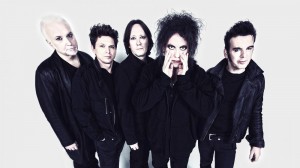The Cure is Needed Now!
- 7月 9, 2019 ● Bands, Experiences, From Fujirockers.org

On March 29th, 2019, as The Cure stood on the red carpet before their induction into the Rock & Roll Hall of Fame, their lead singer – the eternally-lipsticked Robert Smith – was accosted by a brash reporter who, in classic American fashion, belted, “Are you as EXCITED as I am?!?!”. Equally true to form, and visibly wincing from her sensory assault, Mr.Smith quietly replied,”…apparently not”.
Despite their relatively upbeat post-punk debut in 1979, The Cure quickly ascended to the ranks of royalty as “kings of gloom”; people who made it not only acceptable to openly live through one’s depressive states; in the right circles, they even made it look “cool”.
As recent studies reveal that depression is on the rise worldwide, The Cure’s receipt of Rock’s highest honour not only seems fittingly timely; it also validates those who were bullied for being their fans in decades past. And, as Robert Smith and Co. prepare thirtieth anniversary concerts of their album Disintegration (arguably their darkest record) we can almost hear their throngs of fans silently chime, “We told you so”.
Even further cementing their importance, beyond becoming an incidental champion for those who struggle with mental health issues, from The Cure’s earliest performances, Robert Smith also pioneered another modern topic; gender and sexuality. Openly displaying more femininity than the average man since The Cure’s first shows, by 1982 Mr. Smith donned lipstick for all concerts and photo shoots. Even throngs of loyal fans assumed he was bisexual. However, ever-defiant of preconceptions, and consistently breaking new ground by default, Robert Smith would clearly state in interviews that he was monogamously married to a woman he loved; his high school sweetheart, Mary Poole. Once again, decades ahead of popular discourse, he indirectly gave millions permission to be themselves in both gender and sex.
As the band prepares to release a brand new album this autumn – reportedly steeped in “doom and gloom” – to celebrate its fortieth anniversary, its performance at Fuji Rock flows into a twenty-three date marathon of concerts, consisting mostly of appearances at legendary festivals like Glastonbury and Austin City Limits. Some may question the relevance of these ageing pioneers, in a country where visual kei and makeup on men is already seen as passé. However, for a land still struggling with gender equality, LGBTQ rights and epidemic depression, The Cure is a prescription we all need.



